Joseph L. Mankiewicz’s All About Eve (1950):
Criterion Blu-ray review
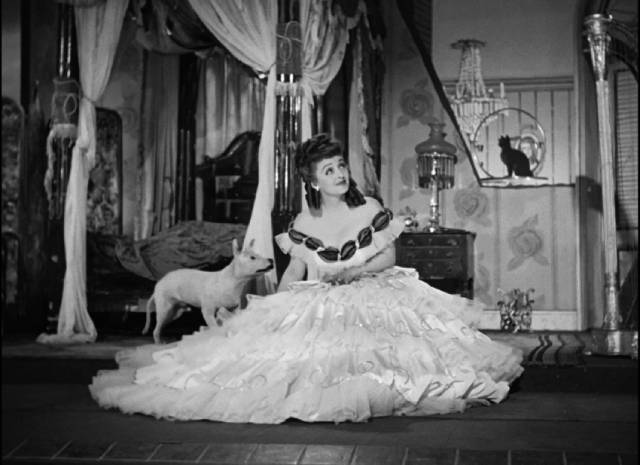
Nothing reveals the tangled relationship between commerce and art in Hollywood more than the Academy Awards. While the Oscars from their inception, with the glitzy ceremonies and the gushing emotions, laid claim to the creative accomplishments of the business, their history so often displays the pull of box office success as the ultimate validation of what is referred to as “the industry”. This is why, looking back over that history, we see that some big winners have all but vanished from the collective memory, while so many overlooked movies are now viewed as cherished classics. The Oscars reflect their moment and show how the industry liked to view itself in that moment.
While Hollywood has a history of promoting entertainment with a capital E, the yearning for prestige, a desire to be taken seriously, has always been present as a strong undercurrent (surfacing with a vengeance in the 1990s with the aggressive and deliberate production of middle-brow Oscar-bait movies like The English Patient and Shakespeare in Love). When the prestige and entertainment stars were perfectly aligned, Hollywood was able to acknowledge success and indulge in self-congratulation at the same time … this occurred spectacularly in 1950, the year Joseph L. Mankiewicz’s All About Eve set a record with fourteen nominations, one which held for forty-seven years until it was finally equalled by James Cameron’s Titanic. (There’s perhaps much to be deduced about the evolving state of the industry by comparing those two.)
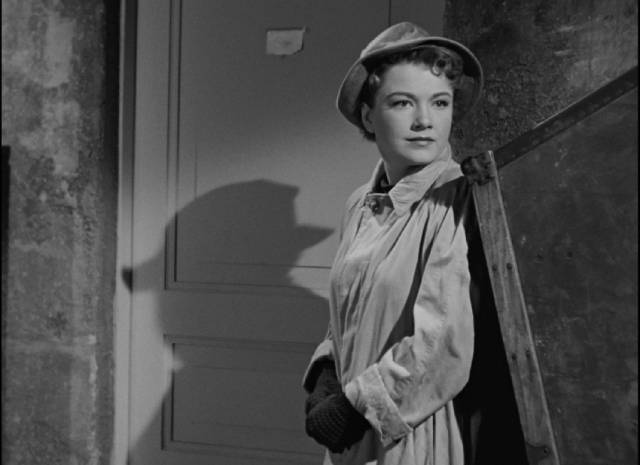
Mankiewicz had been a prolific writer since the end of the silent period, becoming a successful producer in the mid-’30s, and finally being given a chance to direct by Darryl F. Zanuck in 1946 with the Gothic romance Dragonwyck. From the start, Mankiewicz the writer seemed to dominate Mankiewicz the director. His films are most memorable for the wit and virtuosity of their dialogue and the strength of the performances, his direction supportive but unfussy. This seems to give many of his movies a theatrical rather than cinematic quality, although his staging is often subtle in ways which create complex psychological and emotional layers, indicating a nuanced understanding of the camera and its relationship to the performers.
Following his personal success in 1949 with A Letter to Three Wives – winning Best Screenplay and Best Director Oscars – Mankiewicz repeated that feat the next year with his best work, All About Eve (his fourth feature in two years). Based without credit on a short story by Mary Orr, Mankiewicz’s script is a rich, satirical dissection of the entertainment business, set on Broadway rather than in Hollywood, but just as applicable to the movies as it is to theatre – in fact, director Bill Simpson (Gary Merrill) gives an impassioned speech early in the film about “the theatre” being all forms of art and entertainment involving performance, from Broadway to Hollywood to ballet to Punch and Judy. That speech, while making a valid point, offered reassurance to Hollywood that it was just as sophisticated as the snooty New York theatre scene.
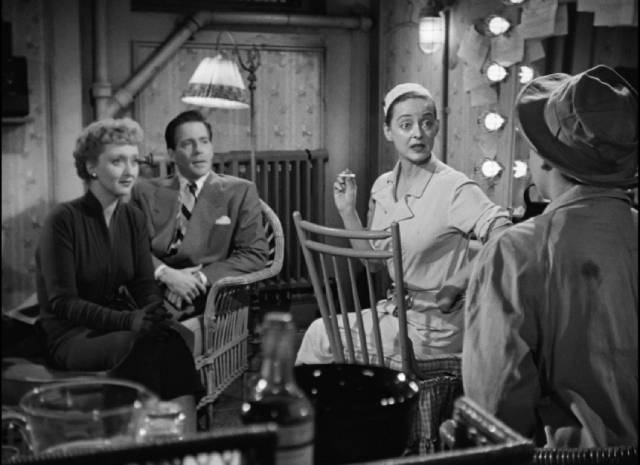
While the sophisticated wit and characterizations etched in acid enabled the industry to bask in reflected glory, the essence of All About Eve is a sharp (even bitter) critique of that same industry and the ways in which its demands and rewards twist the egos of those caught up in it. It’s about celebrity and fandom, the creation of illusions which invoke romantic adoration of the images the industry creates while those who become the images fight against the erasure of who they actually are. All About Eve is about the deep costs of performance, and most crucially the costs to women who become stars.
Margo Channing (Bette Davis) is at the peak of her fame as a Broadway star, but having just turned forty she is becoming acutely aware that her position is at risk. For a woman in the theatre (and movies), forty is getting to be “too old” – the roles which have made her famous are all characters younger than she is now and although her favourite playwright Lloyd Richards (Hugh Marlowe) has just written her a magnificent new part, she risks absurdity by playing so far below her real age. This is the moment at which Eve Harrington (Anne Baxter) enters her life.
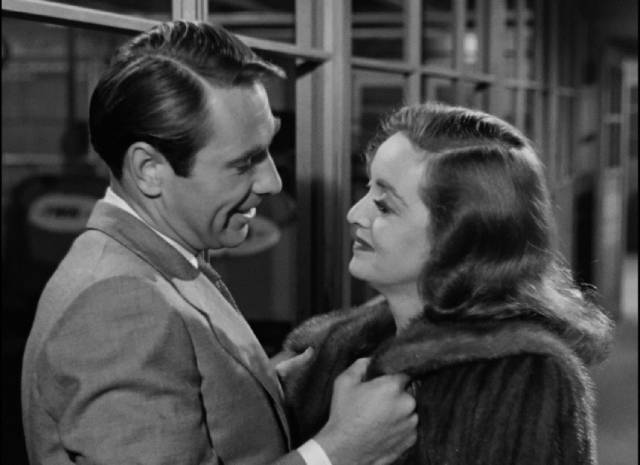
Margot’s friend Karen (Celeste Holm), wife of Lloyd, has spotted Eve hanging around the stage door at every performance of the current hit play. Dressed in a shapeless coat and floppy hat, Eve has the look of a bedraggled waif. When Karen takes her in to meet the star, Eve projects a mousy insecurity as she tells a tale of hardship (poor upbringing, marriage to a young airman who never came home from the war, her discovery of Margot on stage in San Francisco and the admiration she felt which filled the emotional void in her life). While Margot, Karen, Lloyd and the play’s director Bill Simpson are all moved by this confirmation of the power their work has to affect people’s lives, Margot’s assistant Birdie Coonan (the inimitable Thelma Ritter) smells something phony and gets a sharp rebuke from Margot for her cynicism. It’s very pertinent that the one person capable of seeing through a performance, no matter how masterful, is the one who serves rather than takes part in the creation of illusions.
Eve plays to Margot’s ego, her need to be worshipped by her public, and through canny manipulation infiltrates herself into Margot’s life, becoming an indispensable assistant (which only amplifies Birdie’s distrust as she’s edged out of her own role). It takes some time before Margot gradually realizes that Eve is not so much a supplicant as a succubus, a kind of charming monster who is determined not simply to admire Margot, but rather to take her place. Structurally, All About Eve resembles a horror movie in which only one character is aware of the threat posed by a deceptively charming interloper … with that character appearing deranged to others who believe she’s delusional and overreacting to harmless behaviour.
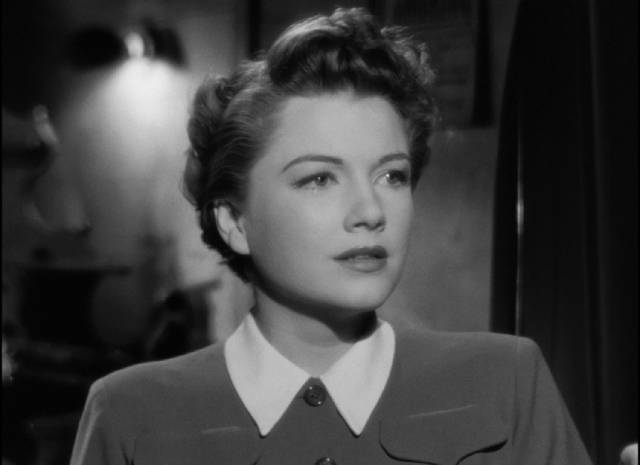
What Eve has triggered in Margot is a deep and inevitable insecurity. The star knows that her position can’t be sustained as she grows older – the business won’t allow it, and if she tries to cling to her established image adulation will inevitably become mockery. Margot’s crisis is that of a performer who has long sustained a role for which she may now no longer be suitable. Her growing hostility towards Eve is rooted in being forced to confront that fact; her bitter reactions serve to make everyone around her realize that she really has reached the end of a phase … with what comes next uncertain.
The story, although narrated by several characters who observe what is unfolding, is seen largely from Margot’s perspective. An unspoken question hanging over Margot’s conflict – internal with herself and external with Eve – is how she herself attained the pinnacle of stardom. We see Eve as a manipulative interloper, but Margot herself at some point had risen from nowhere and replaced other stars who were confronting the same issues she now faces … Eve is not really malevolent; she’s an essential part of the entire system which Margot and Bill and Lloyd have somehow come to take for granted, accepting their own positions as a matter of natural right. They’ve all come to believe in their roles in that system, and Eve’s intrusion exposes the underlying artifice which has enabled them to obtain their own stature.
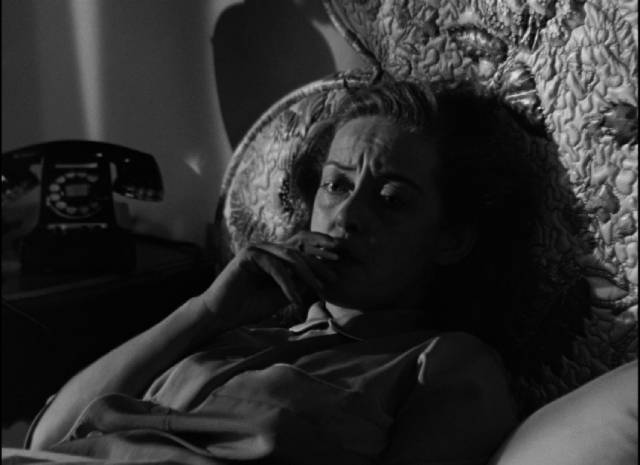
Eve’s intrusion finally helps Margot to find a renewed sense of herself beyond her role as the great star Margot Channing, making it possible to move past what was becoming a limitation – her clinging to a now problematic image as a younger woman on stage. The ferocity and bitterness displayed by Margot gains its energy from Davis’ complete identification with the role – as a hugely popular, award-winning (two Best Actress Oscars) actor who had recently entered her 40s and had seen her career sliding into decline. By playing a character much like her real self, facing a central existential dilemma, Davis was energized to a degree which revived her career – she told Mankiewicz that he had brought her back from the dead. It’s impossible to imagine anyone other than Davis in the role of Margot Channing, and yet she was a last-minute replacement for Claudette Colbert, who had been cast but injured her back two weeks before the start of production.
Mankiewicz, having depicted the entertainment ecosystem with keen insight, ends with his most chilling note. Eve has attained star status by skilfully imitating Margot; coming home from the awards ceremony which has framed the narrative, she discovers a young woman sleeping in her apartment. Phoebe (Barbara Bates) is a huge fan who, like Eve herself, would love to model herself on the star she adores. The final image is of Phoebe caught in infinitely reflecting mirrors in Eve’s bedroom, multiple exact duplicates all holding up the award, representative of the vast audience which dreams of being just like their idols – that is, the dream of being someone else rather than their own authentic selves.
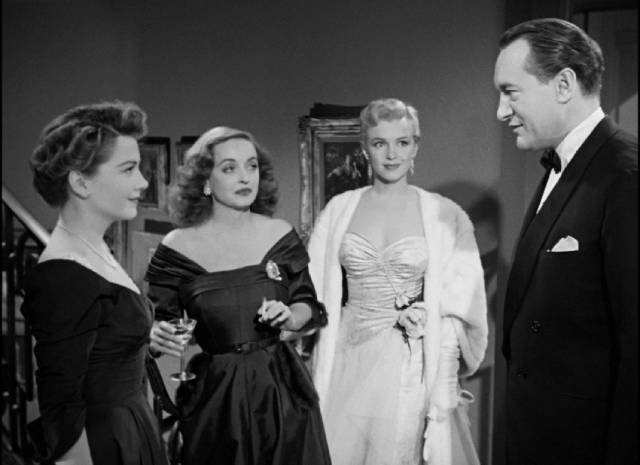
All About Eve is a movie with many pleasures, beginning with Mankiewicz’s dialogue. While not naturalistic, its theatricality contains a kind of realism because even in their off-stage lives, the characters are all playing roles. It’s Mankiewicz’s strength to reveal the actual people behind those roles. Staged and filmed with skill and efficiency, the pleasures of All About Eve are aural perhaps more than visual. It’s the Hollywood equivalent of an Oscar Wilde play.
But all that great dialogue may not have amounted to much without Mankiewicz’s ability to cast and direct actors. The entire ensemble, from Davis on down, is impeccable, with even the smallest bit parts invested with depth and nuance – in a couple of brief scenes, Marilyn Monroe displays the qualities which would soon make her a star, while Barbara Bates sums up the film’s theme in one brief scene at the end. And providing the on-screen representation of Mankiewicz’s point of view, George Sanders was never better than as the bitterly cynical theatre critic Addison DeWitt, who relishes the power he wields over these people who deep down suffer agonies of insecurity.
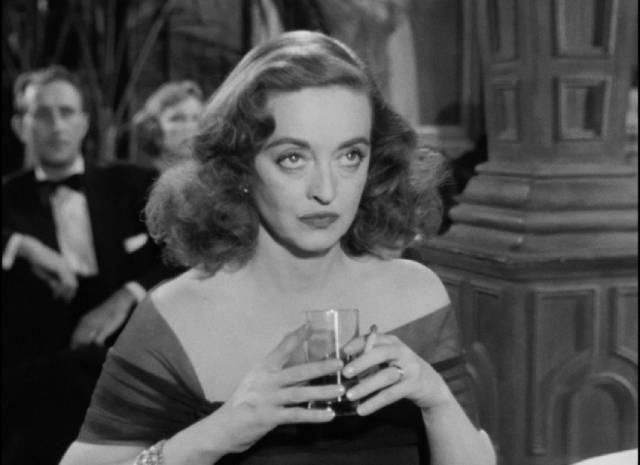
In 1950, Hollywood embraced this gleefully acidic portrait of show business because it reflected the industry with wit and style; that embrace showed just how sophisticated Tinsel Town liked to think it was. Ironically, having been awarded writing and directing Oscars two years in a row, Mankiewicz took the honours and left town because he didn’t feel comfortable there. He started his own company and, a couple of years later, made his first independent feature: The Barefoot Contessa (1954) addressed Hollywood directly, using a structure similar to All About Eve’s … but with less success, slipping into overwrought melodrama despite an excellent cast.
*
The disk
Criterion’s Blu-ray uses a 4K restoration taken from a 35mm fine grain print and it looks excellent, with pleasing grain texture and contrast. The mono soundtrack provides clear audio which makes every word of Mankiewicz’s rich dialogue perfectly intelligible.
The supplements
Criterion have packed their release with a second disk of extras, totalling more than five hours. Some of these are new, some carried over from previous Fox releases.
The first disk includes two commentaries recorded in 2010, one with actress Celeste Holm, author Kenneth L. Geist and Mankiewicz’s son Christopher; the other with author Sam Staggs.
The second disk repeats a number of featurettes, including two pieces on Mankiewicz’s career from 2010, Directed by Joseph L. Mankiewicz (26:02) and Joseph L. Mankiewicz: A Personal Journey (25:59); Hollywood Backstories “All About Eve” (2001, 24:21); a brief promotion piece with Davis (1950, 1:16); and two other featurettes from 2010 – The Real Eve (18:10), about the source story by Mary Orr, which was reputedly based on something experienced by German actress Elizabeth Bergner, and The Secret of Sarah Siddons (7:02), about a theatrical society created in Chicago in the early 1950s which was based on the fictional society in the film.
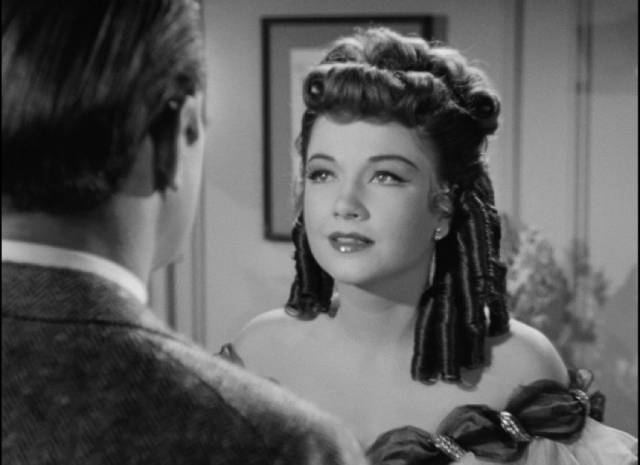
Criterion’s new additions are two episodes of The Dick Cavett Show, one with Davis (1969, 19:56), the other with Gary Merrill (1980, 28:42); a Lux Radio Theatre broadcast from 1951 (59:55); and All About Mankiewicz (1983, 1:46:45), a conversation between the director and French critic Michel Ciment shot in Berlin and New England.
The booklet contains an essay by critic Terrence Rafferty and a reprint of Orr’s short story, which is chiefly interesting for showing how much Mankiewicz added to the core idea.
One final note: this release has the worst packaging I’ve ever encountered from Criterion. Inside the cardboard sleeve, which is fairly standard, the disks are contained in a cardboard foldout to which they are attached by rubber hubs from which it is almost impossible to remove them. You have to bend the cardboard and get your fingers underneath, trying not to crack the disks with the effort it takes to release them. You inevitably get fingerprints on the playing surface and have to clean the disks before playing them. How is it that no one notices these kinds of problems at any point during the manufacturing process?
Comments
Fine stuff about a great film.